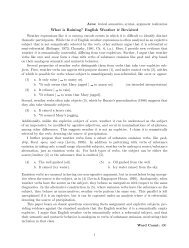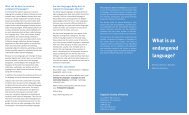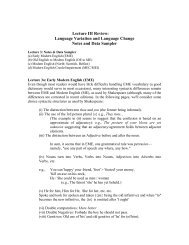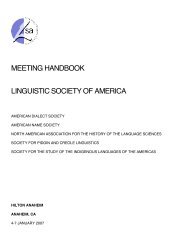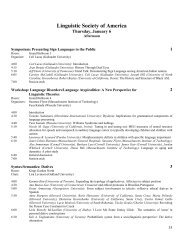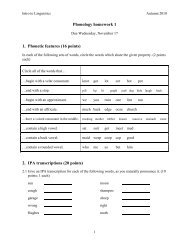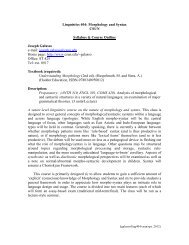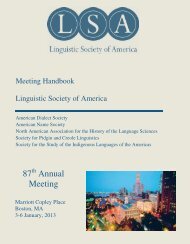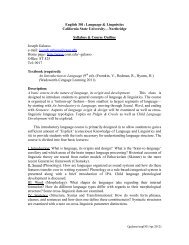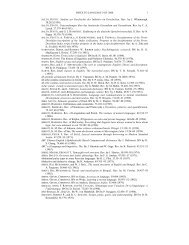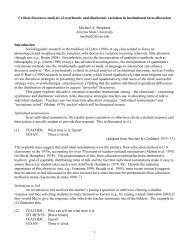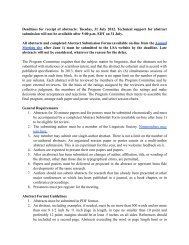here - Linguistic Society of America
here - Linguistic Society of America
here - Linguistic Society of America
Create successful ePaper yourself
Turn your PDF publications into a flip-book with our unique Google optimized e-Paper software.
The existence <strong>of</strong> the Person-Case Constraint (PCC) in Slavic has remained controversial (yes in Czech for Medová 2009;Sturgeon et. al. 2010, i.a.; no in Czech and Serbian/Croatian for Haspelmath 2004, Migdalski 2006, Hana 2007, i.a.). In this talk, Iprovide a unified analysis accounting for both presence and absence <strong>of</strong> the PCC in Slavic. Based on idiolectal variations in thedata, I argue for a morphological filter-based approach that can account for these variations. Further, I extend the analysis toRomance.David Ruskin (University <strong>of</strong> Rochester) Session 79Elissa L. Newport (Georgetown University)Learning and maintenance <strong>of</strong> variation varies with grammaticizationJargons and early pidgins are notoriously variable. As pidgins creolize, variation in the language becomes reduced. However, ithas been claimed that variation reduces at different rates in different lexical and grammatical categories. Open-class categoriessettle earlier than closed-class features. In this experimental study, we investigate whether subjects will show differences in theirhandling <strong>of</strong> variation across different grammatical categories. As predicted, subjects’ learning and maintenance <strong>of</strong> variation doindeed vary with grammaticization. The results closely mirror language patterns typical <strong>of</strong> early pidgins, and suggest that thistypological similarity may be partially due to underlying cognitive factors.Eric Russell Webb (University <strong>of</strong> California, Davis) Session 79Creolistics and formal grammar: a dialogue <strong>of</strong> challenges and opportunitiesRussell Webb (in press) argues that creole particularity is motivated by sociolinguistic factors. This presentation asks how formalmodels might capture these forces and their effect, focusing on phonology. If holistic speaker competence and externallymotivated change are assumed, contemporary formalisms cannot adequately respond to creole data. I propose a series <strong>of</strong>modifications. Firstly, input and output representations must capture variables normally considered grammar-external and moretypes <strong>of</strong> speaker knowledge. Secondly, grammatical units must refer to sociolinguistic faithfulness and markedness. Finally, thearchitecture <strong>of</strong> competence must make room for output-to-input feedback.Stephanie Russo (University <strong>of</strong> Texas at Austin) Session 17West Germanic consonant geminationThe process <strong>of</strong> consonant gemination in West Germanic (<strong>here</strong>after WGG) is a long-standing debate in historical linguistics. WGGoccurred most regularly between a short vowel and an immediately following j, seen in Old Saxon (1):1. Gothic fremjan; Old Saxon fremmian ‘to perform’Denton (1998) argues that VOT (voice onset time) <strong>of</strong> the consonant preceding the high glide j is the primary acoustic cue ingeminate perception. Counter to Denton (1998), I argue that increase in closure duration <strong>of</strong> the preceding consonant, not VOT, isthe single-overriding cue distinguishing geminates from non-geminates, accounting for WGG in a more satisfactory manner.Kevin Ryan (Harvard University) Session 28Gradient onset weight effects in stress and meterThis talk presents new evidence supporting onsets as contributors to syllable weight. Unlike most previous research on onsetweight, which focuses on categorical criteria, I examine stress systems and meters exhibiting variation. For example, in Englishand Russian, syllables with longer onsets are greater attractors <strong>of</strong> stress/accent, all else equal. This holds for both the lexicon andwugs (even wugs in neighborhoods in which analogical models predict the effect to be reversed). Onset weight is also productivein quantitative meters, e.g. in Sanskrit, w<strong>here</strong> syllables with longer onsets are more likely to be placed in heavier positions, allelse equal.Craig Sailor (University <strong>of</strong> California, Los Angeles) Session 8Questionable negation<strong>America</strong>n English (AE) speakers generally cannot interpret negation-initial polar questions (NIQs) as questions about negativepropositions; thus, they reject NIQs containing strict-NPIs: *Isn’t Jane coming either?. This contradicts the literature,necessitating a new theory. I argue that negation (-n’t) in AE NIQs is metalinguistic, capturing its failure to license strict-NPIsand anti-license strict-PPIs, and accounting for NIQs’ bias: like certain other instances <strong>of</strong> metalinguistic negation, NIQs’ –n’tcancels an implicature; <strong>here</strong>, an epistemic neutrality implicature (w.r.t. possible answers) that I claim all polar-Qs carry. Thisyields NIQs’ ¬[neutral] interpretation, and aligns NIQs with recent work in the Inquisitive Semantics framework.Bern Samko (University <strong>of</strong> California, Santa Cruz) Session 34On not deriving auxiliary have from be200



